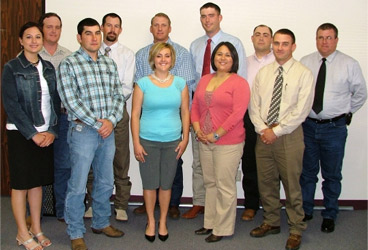
Texas FSA Starts Management Trainees on Fast Track
By: Cassie Bable
The Texas Farm Service Agency (FSA) has a fast-paced, unique process for training new hires for management positions. A fresh crop of 10 County Operations Trainees (COTs) and one Farm Loan Officer Trainee (FLOT) began a one-year training program this month.
Most private sector businesses require at least five to 10 years of experience before an employee can be promoted through the ranks to a management position. “There’s no doubt it would be beneficial for [FSA’s] training period to be longer; however, our current agency regulations require only a minimum of one year for training with the understanding that the trainee meets certification requirements,” said Juan Garcia, Acting State Executive Director (SED).
The training begins with a week-long orientation at the State Office. “The purpose of orientation is to get the trainees together and familiarize them with our state office employees, program areas and agency protocol,” said Ted Peabody, Chief, Commodity/Compliance Division and trainee program coordinator. The management training course includes an overview of FSA programs and exercises that evaluate each new employee’s strengths, weaknesses and work style.
Following orientation, trainees hit the ground running, studying management techniques, customer service skills and procedures for conducting County Committee meetings.
Near the completion of the training process, trainees will return to the State Office for an intense management and human resource training session, where they review case studies and scenarios they are likely to face as managers. All training is carefully planned and intended to prepare employees for situations they will encounter as a CED, Farm Loan Officer (FLO) or Farm Loan Manager (FLM). Additionally, trainees make presentations about FSA programs to groups of producers, and in the latter part of the training process may serve as an acting manager in an office.
After they complete the training program, the Texas COTs and FLOTs may find themselves interviewing for a position in any one of almost 200 County Offices. While that sounds like a great opportunity, it can be a daunting task for a trainee to master, in 12 months, the wide variety of crops, agricultural products, cultivation practices, and geographical and climatic challenges that are all a part of Texas agriculture.
“The biggest challenge facing a trainee in a management position is realizing they are solely responsible for county operations,” said County Executive Director (CED) and COT trainer Russ Garmon. “Once they get over the initial shock, they will be successful if they have a strong work ethic, effective communication skills, and if they learned program techniques from the training.” Even after a certified trainee is promoted to management, they continue to learn while leading the county.
Staff provide invaluable support to managers during this period of training. “Texas FSA trainees have a major advantage,” said Garmon. “We have a large network of employees to use as resources, all of whom are willing to do their part to help COTs succeed.”
FSA’s hands-on approach to training is partly due to the fact that FSA operates differently than any other government agency. County level employees, including COTs and CEDs work directly for a locally-elected producer committee as well as the federal government.
The Texas COT/FLOT training process starts with a panel review of all qualified applicants. Members of the review panel typically represent a cross-section of FSA leadership in Texas. This year, the panel selected 11 new hires from a pool of 90 applicants.
After the hiring process, the State Committee selects training locations and trainers. The trainers become designated mentors and develop a plan that facilitates maximum FSA program and agricultural production experience, and ensure that it includes cross-training opportunities in other counties so trainees are prepared to manage in any county in the state.
Progress is monitored through quarterly evaluations, “Based on the final evaluation, we determine if trainees are eligible for State Committee certification and ultimately placement in a management position with the agency,” said Garcia.
Although it is a fast-paced program requiring tremendous dedication and hard work, Texas FSA has seen great success from the program. Most employees enthusiastically seize the opportunity to progress their career at this rapid pace. “I think FSA recognizes my talent more than the private sector,” said Eric Mortimer, Robertson County FLOT.

The 2009 County Operations Trainees (COTs) and one Farm Loan Officer Trainee (FLOT) will spend 12 months in formal training in preparation for their management positions.

Veronica Crum of Bee County, Texas, learns more about her new role as a County Office Trainee.